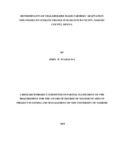| dc.contributor.author | Wamalwa John W. | |
| dc.date.accessioned | 2017-01-06T10:26:48Z | |
| dc.date.available | 2017-01-06T10:26:48Z | |
| dc.date.issued | 2015 | |
| dc.identifier.uri | http://hdl.handle.net/11295/99640 | |
| dc.description.abstract | Kenya‘s agricultural sector contributes significantly to the economy which directly contributes 26 percent of the annual Gross Domestic Product (GDP) and another 25 percent indirectly. The sector accounts for 65 percent of Kenya‘s total exports and provides over 70 percent of informal employment in the rural areas. As such any climatic changes would impact greatly on the country‘s agricultural sector a concern for everyone in the country. Therefore, this study aimed at investigating the determinants of small holder maize farmers‘ adaptation strategies to climate change in Bahati Sub-County, Nakuru County. This study was guided by the following objectives; to establish the extent to which labour supply determine small holder Maize farmers adaptation strategies to climate change in Bahati Sub-County, Nakuru County, to assess the extent to which agricultural extension service determine small holder Maize farmers adaptation strategies to climate change in Bahati Sub-County, Nakuru County, to examine the extent to which socio-economic determine small holder Maize farmers adaptation strategies to climate change in Bahati Sub-County, Nakuru County. Descriptive survey design was used for the study with the target population being the farmers in Bahati Sub-County, Nakuru County. The sample was made up of 225 respondents. Primary as well as secondary data sources were used for the study and analyzed using descriptive statistics. Data was collected using questionnaires as the main study instruments. The analysis of the data was done using the Statistical Package for Social Scientists (SPSS) version 21. Data was presented in form of tables. Descriptive statistics were presented in form of frequencies, percentages, means and standard deviations. Inferential statistics were in form of pearson correlation coefficient to show the relationship between the independent and the dependent variable. the study found out that labour supply and financial capabilities do not have significant relationship with adaptation to climatic change. Agricultural extension services were found to have a weak negative significant relationship with adaptation to climatic change. The researcher concluded that agricultural extension services negatively influenced adaptation to climatic change. It was recommended that the government should organize seminars to train farmers on new ways of farming for them to be able to adapt to climatic changes and that farmers should embrace irrigation methods in their maize farming to ensure production through out the year. | en_US |
| dc.language.iso | en | en_US |
| dc.publisher | University of Nairobi | en_US |
| dc.rights | Attribution-NonCommercial-NoDerivs 3.0 United States | * |
| dc.rights.uri | http://creativecommons.org/licenses/by-nc-nd/3.0/us/ | * |
| dc.subject | Determinants Of Smallholder Maize Farmers’ Adaptation Strategies To Climate Change In Bahati Sub-County, Nakuru County, Kenya. | en_US |
| dc.title | Determinants Of Smallholder Maize Farmers’ Adaptation Strategies To Climate Change In Bahati Sub-County, Nakuru County, Kenya | en_US |
| dc.type | Thesis | en_US |



